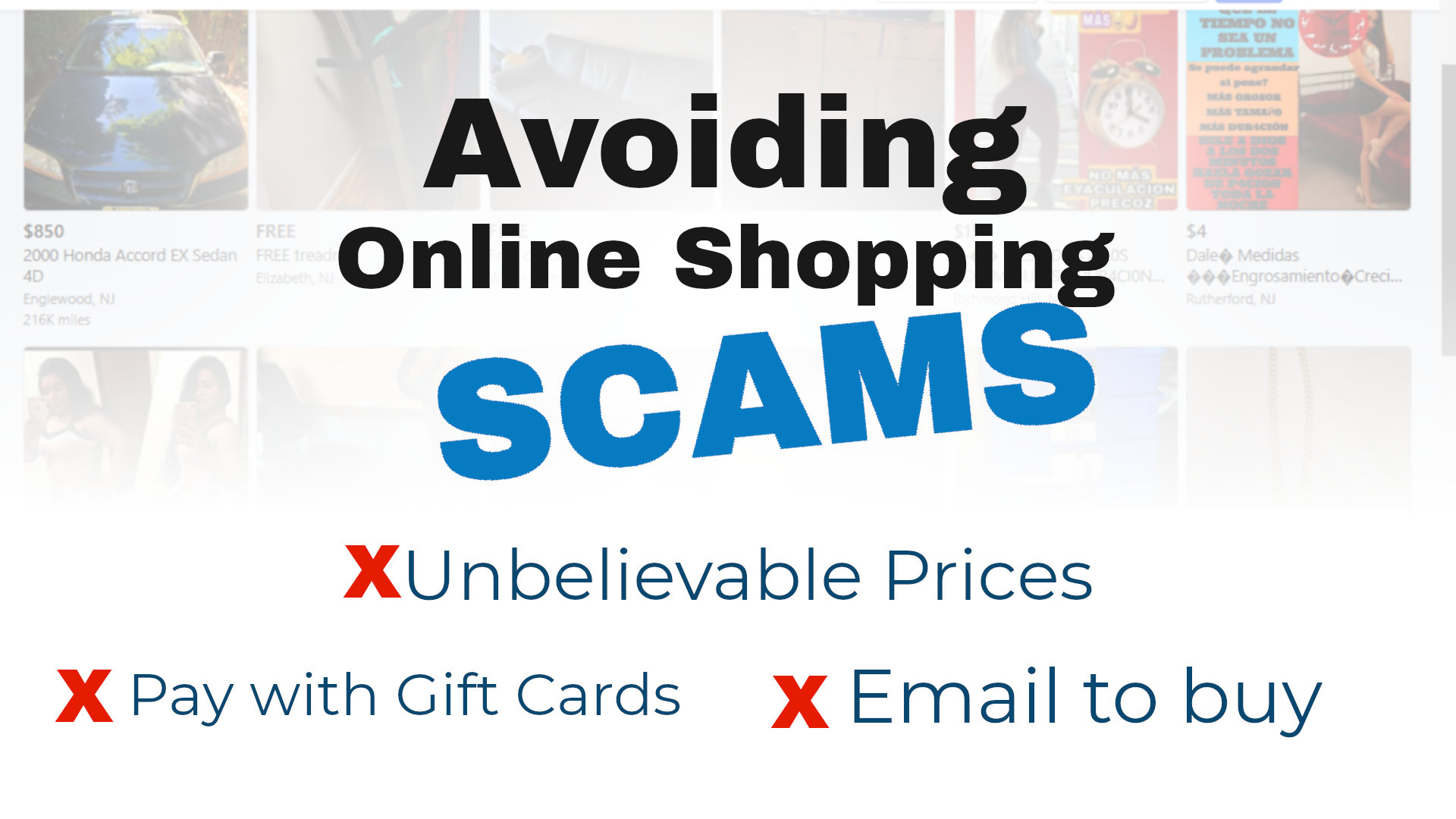Online shopping scams happen all year, but the holiday season has many people looking for a wider variety of goods than normal, all on a short time frame, and in a high quantity. And, so it’s a big time of year for scams.
So make sure to warn your friends and family on how to recognize scams when shopping online because the only way to stop online shopping scams is to educate everyone on what to look out for when shopping online.
There is a dizzying list of scams that have been seen online. Listed here by ProPublica, they “describe frauds involving lottery numbers, puppies, apartment rentals, PlayStation 5 and Xbox gaming consoles, work visas, sports betting, loans, outdoor pools, Bitcoin, auto insurance, event tickets, vaccine cards, male enhancement products, miracle beauty creams, vehicle sales, furniture, tools, shipping containers, Brazilian rainforest land and even egg farms, among other enterprises.”1
Fortunately for us, many scams follow a formula, and in this blog, we’ll be covering some of the common scams you’ll see and how to recognize them when you’re shopping online.
Increasing Numbers of Online Shopping Scams
According to the Internet Crime Complaint Center2, the number of complaints for ‘Misrepresentation’ (where the product received is not the product that was ordered) rose from 5,975 in 2019, to 24,276 in 2020. And, the number of complaints for ‘Non-Payment/Non-Delivery’ (where either the item was shipped but not paid for, or paid for but not shipped) rose from 61,832 in 2019, to 108,869 in 2020. The FBI also lists “Non-Deliverability of Merchandise” as a common scam4. These are significant increases in categories that correlate to online shopping activities during this time period.
According to the Better Business Bureau3, if the price is too good to be true, it probably is, but searching out those ‘great deals’ with the ‘best price’ frequently lead people to scammers. The second reason people buy from a scammer is that they are promised a hard-to-find item. These vulnerabilities have been increasingly exploited during the pandemic, where everyone is relying more on the internet to connect us.
Common Online Shopping Scams
AARP6 describes online shopping scams: “[t]he typical shopping scam starts with a bogus website, mobile app or social media ad. Some faux e-stores are invented from whole cloth, but many mimic trusted retailers, with familiar logos and slogans and a URL that’s easily mistaken for the real thing. They offer popular items at a fraction of the usual cost and promise perks like free shipping and overnight delivery, exploiting the premium online shoppers put on price and speed.”
Here are a few specific online scams:
Pet Adoption
The Better Business Bureau7 provides an example of this scam: “a scammer claimed to be finding a new home for her poodle after a car accident left her unable to care for the dog. In other cases, scammers impersonate real animal shelters.”
“In this version of the puppy scam, the scammer may not charge for the dog. Instead, they ask for a refundable deposit to ‘hold’ the pup or request payment to ship the pet to your home. Most scammers ask you to pay through a digital wallet (Zelle was mentioned in several reports) or use a pre-paid debit card or gift card. Although this scam mostly involves dogs, it can also include cats and other pets.”
“After you pay, the problems start. One victim reported driving to the ‘shelter’ to pick up their new dog, only to find no such address existed.”
They recommend not buying a pet without seeing it in person first. They also recommend doing a reverse image lookup in Google to make sure the pet image hasn’t been reused from somewhere.
? Checking out your local animal shelters can be a great way to find the perfect pet for your family!
Ticket Scams5
“Ticket selling scams happen when a scammer uses tickets as bait to steal your money. The scammer usually sells fake tickets, or you pay for a ticket, but never receive it. They are common when tickets for popular concerts, plays, and sporting events sell out.”
This scam falls into the failure to deliver merchandise category, so make sure you do your homework on the seller. You can find a guide on smart online shopping here from the Federal Trade Commission8.
Rental Scams1
According to ProPublica1, here is how an example Rental Scam might work.
“Scammers copy photos from legitimate real estate ads and repost them in bogus Marketplace listings, offering homes and apartments at below market rates. Often, the fraudsters use hacked accounts belonging to real estate agents to make their listings appear more legitimate. They may tell prospective renters that the apartment can’t be viewed in person due to the pandemic, but send additional photos and information to put people at ease. The crooks convince the renter to send a deposit via an electronic payment service and promise to use a courier to send the keys, which never arrive.”
Auto Sale Scams1
ProPublica1 provides this description of a scam involving the sale of a motor vehicle.
“Fraudsters typically post a listing with multiple photos of an appealing vehicle, priced well below market rate. When interested buyers reach out, scammers send a detailed message with information about the maintenance and ownership history of the vehicle. They also may explain that the price is low because the vehicle belonged to a recently deceased relative, or because the seller is a U.S. soldier about to ship out.”
“The thieves ask potential buyers to share basic personal information so they can arrange what they falsely claim is a secure purchase via an escrow service, or eBay’s Vehicle Purchase Protection plan, which provides up to $100,000 in repayment for losses associated with fraud. The eBay program, however, only works for vehicle purchases made on eBay. Once buyers send money to what they think is a legitimate third party, the seller breaks off contact.”
“Experts said that scam vehicle listings typically show a price significantly lower than the value of the truck or car; feature a description instructing prospective buyers to contact the seller by email; and show that the user has turned on the “vacation” feature, which prevents people from using Facebook Messenger to contact the account that posted the listing. Fake or compromised accounts often post dozens of identical vehicle listings targeted at locations all over the U.S.”
These are only some of the types of scams you might see while online shopping. Keep reading for some more general guidance.
How to Spot a Scam Shopping Online
There are some common red flags that could give you a clue that an offer is a scam. Here is a list of red flags you might see:
- Prices lower than you expected, especially for hard-to-find items 3,6,9
- The seller pressures you into a different payment method – especially apps like Zelle or gift cards 7,9
- The seller makes excuses about why you can’t see the item before you pay 9
- The seller has multiple listings for the same item in different locations9
- The seller wants you to contact them on a different platform (email or another app) to complete the transaction9
These are not the only signs of a scam. Check out How to avoid being scammed on Facebook Marketplace (ProPublica9), the Better Business Bureau’s10 BBB Tips: 10 Steps to Avoid Scams, and our blogs Recognizing Scams and Protecting Yourself from Phishing Scams.
Make sure to do your research on the seller. Scammers will use hacked accounts to make themselves look legitimate, so it’s important to look closely.
Reporting Scams
Once you know it’s a scam, you can report it on the platform where you found it and to your state consumer protection office13. You can find your state’s consumer protection office here13.
You can also report it to the Federal Trade Commission here and the Better Business Bureau here16. One of the signs that an offer is a scam is that their contact information has been cited in scam reports, so you’re helping everyone stay safer if you submit a scam report.
Protecting Yourself After a Scam
“If you lost money or other possessions in a scam, report it to your local police”13 in addition to the reporting outlined above.
The Federal Trade Commission has a list of ways you might have given valuable information to a scammer, and what to do in each situation here14. For example, “If you gave your username and password to a scammer, change your password right away. If you use the same password for other accounts or sites, change it there, too.”14
Conclusion
ProPublica reported that “[m]ultiple Marketplace contract workers told ProPublica they rarely, if ever, stop scams before they happen. The contractors get involved after someone has already been ripped off, banning fraudsters and in some cases helping restore hacked Facebook accounts to their original users.”1 You can’t rely on the platform to make sure your transactions will be successful.
So, while you’re shopping online be careful: research who you’re buying from and only buy from legitimate sources you can trust to deliver.
I hope this article has helped you be able to recognize signs of an online shopping scam. What scams have you seen shopping online? Let me know in the comments!
References and Further Reading
- Thompson, A. C., Silverman, C., & Elkind, P. (2021, September 22). Facebook grew marketplace to 1 billion users. now scammers are using it to target people around the world. ProPublica. Retrieved October 19, 2021, from https://www.propublica.org/article/facebook-grew-marketplace-to-1-billion-users-now-scammers-are-using-it-to-target-people-around-the-world.
- 2020 Annual Report. (n.d.). Internet Crime Complaint Center. Retrieved October 19, 2021, from https://www.ic3.gov/Media/PDF/AnnualReport/2020_IC3Report.pdf.
- BBB research shows Spike in online purchase scams since COVID started. (2020, October 27). Better Business Bureau. Retrieved October 19, 2021, from https://www.bbb.org/article/news-releases/23276-bbb-research-shows-spike-in-online-purchase-scams-since-covid-started.
- Non-Delivery of Merchandise. (n.d.) Federal Bureau of Investigation. Retrieved October 19, 2021, from https://www.fbi.gov/scams-and-safety/common-scams-and-crimes/non-delivery-of-merchandise.
- Common Scams and Frauds. (n.d.). USA.gov. Retrieved October 19, 2021, from https://www.usa.gov/common-scams-frauds.
- Online Shopping Scams. (2021, October 12). AARP. Retrieved October 19, 2021, from https://www.aarp.org/money/scams-fraud/info-2019/online-shopping.html.
- BBB Scam Alert: Adopting a rescue dog? Watch out for phony fees. (n.d.) Better Business Bureau. Retrieved October 19, 2021, from https://www.bbb.org/article/scams/18240-scam-alert-adopting-a-rescue-dog-watch-out-for-phony-fees.
- Online Shopping. (n.d.). Federal Trade Commission. Retrieved October 19, 2021, from https://www.consumer.ftc.gov/articles/online-shopping.
- Morran, C., Silverman, C., & Eliahou, M. (2021, September 22). How to avoid being scammed on Facebook Marketplace. ProPublica. Retrieved October 19, 2021, from https://www.propublica.org/article/how-to-avoid-being-scammed-on-facebook-marketplace.
- BBB Tips: 10 Steps to Avoid Scams. (2020, April 30). Better Business Bureau. Retrieved October 20, 2021, from https://www.bbb.org/article/scams/8767-bbb-tips-10-steps-to-avoid-scams.
- Online Holiday Shopping Scams. (2020, November 24). Cybersecurity & Infrastructure Security Agency. Retrieved October 19, 2021, from https://us-cert.cisa.gov/ncas/current-activity/2020/11/24/online-holiday-shopping-scams.
- Report Scams and Frauds. (n.d.). USA.gov. Retrieved October 20, 2021, from https://www.usa.gov/stop-scams-frauds.
- State Consumer Protection Offices. (n.d.). USA.gov. Retrieved October 20, 2021, from https://www.usa.gov/state-consumer.
- Phone Scams. (n.d.). Federal Trade Commission. Retrieved October 20, 2021, from https://www.consumer.ftc.gov/articles/phone-scams.
- New Data Shows FTC Received 2.2 Million Fraud Reports from Consumers in 2020. (2021, February 4.). Federal Trade Commission. Retrieved October 19, 2021, from https://www.ftc.gov/news-events/press-releases/2021/02/new-data-shows-ftc-received-2-2-million-fraud-reports-consumers.
- Scam Tracker. (n.d.). Better Business Bureau. Retrieved October 20, 2021, from https://www.bbb.org/scamtracker.



